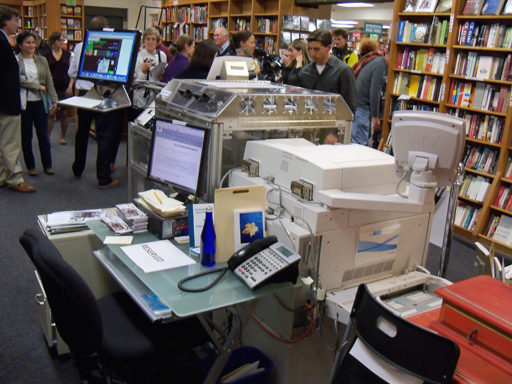
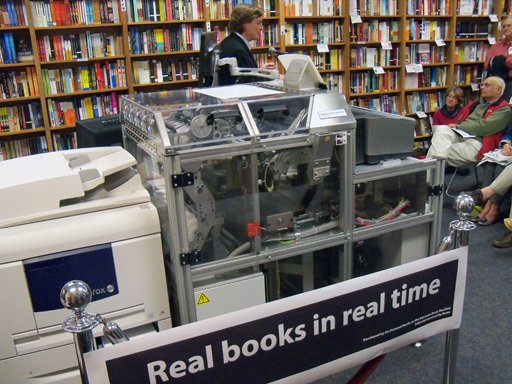
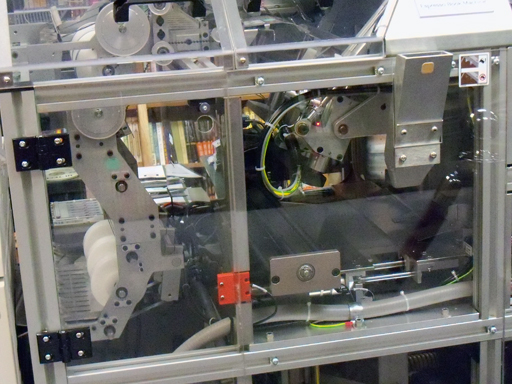
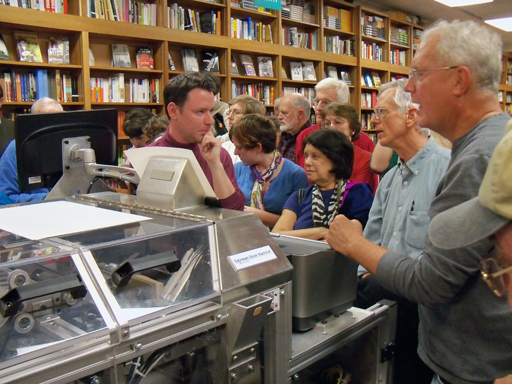
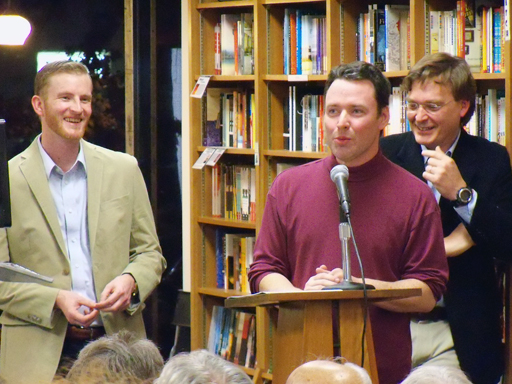
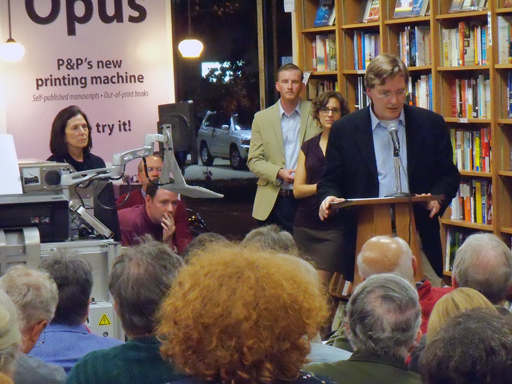
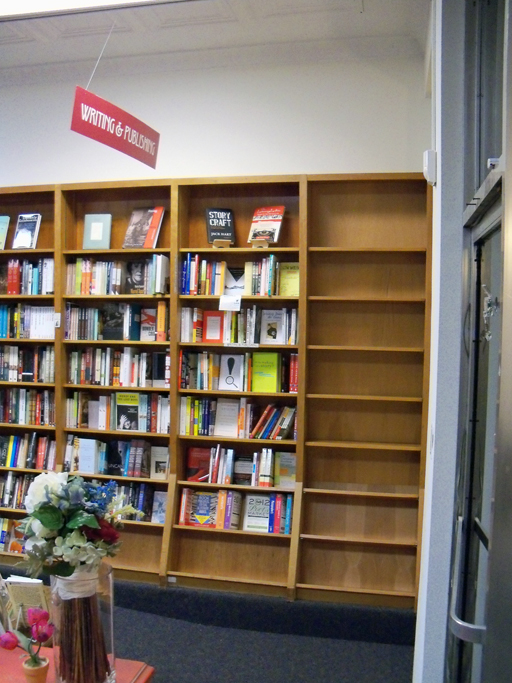







Paul D. Shinkman, wtop.com
Update: 12:43 p.m. Thursday, Nov. 9
WASHINGTON — The on-demand book machine unveiled at Politics & Prose Wednesday evening serves as more than just a vehicle for publishing independent volumes, the staff says. It’s a way for local writers to realize their dream.
A large crowd of local residents and book enthusiasts spilled out of the Fiction Room into the main space of the Northwest D.C. shop Wednesday night to hear the discussion by P&P staffers and Thor Sigvaldason, one of the founders On Demand Books, the machine’s developer.
“The goal of this was ‘Shakespeare in Africa,'” Sigvaldason said of the machine’s original purpose to provide readily accessible important tomes. During the initial production, however, the focus shifted to “Can you publish my book?”
The founder touched upon the motivation behind Politics & Prose installing the machine, which the store owner describes as “a time to realize the dream” of seeing a private work in print.
“We’re here and ready to print anybody’s manuscript,” Bradley Graham said.
And it doesn’t stop at printing. For those who opt for the initial $99 fee to have a staffer help format the book, the final result will be sold on the store’s shelves for three months. The author gets to keep 80 percent of the profits.
Investing in the machine, which costs more than $100,000, is a big step for a small business like Politics & Prose. Other bookstores in the country have been able to make a profit. Part of the proceeds return to the manufacturer to pay for the copyrights to Google Books, HarperCollins, and other distributors that provide books to print.
“It’s not a strict money-making thing,” said Bill Leggett, one of two floor managers trained to use the machine. “We want to help (local residents and authors) take their book and make it happen, and we’re going to help them every step of the way.”
“Hopefully it’s a point of pride. It’s their book,” he said. “They can take their dream and see it on a shelf, and hopefully someone will walk up to it and like it enough to walk out the door with it.”
It isn’t just the added convenience that makes this machine an important fixture in the area literature scene. One local resident who showed up to Wednesday’s unveiling, referring to himself as “Freddy C.,” has become weary of dealing with the established self-publishing industry he says is “expensive and cynical.”
“This is more of a neighbor-friendly environment. You feel like the people know you,” he said. “There’s an element of embedded trust.”
“With so many things going against the book industry — where it’s going electronic or book stores closing — it’s good to know there’s an addition for those who might not have a big-name publisher. This is just an inroad to become one, or just to tell a story.”
Check out this video of the machine’s inaugural public printing:
Original article: 8:09 a.m. Wednesday, Nov. 8
WASHINGTON — Area residents will become among the first few in the country Wednesday to be able to publish their own books with the touch of a button.
Politics & Prose, the de facto headquarters of the D.C. area literati, unveils its Espresso Book Machine, dubbed ‘Opus’ by the staff, Wednesday evening. It allows customers to publish personal, out-of-print or unavailable volumes.
Two members of the staff have been training on the machine during the month-long installation process to provide a series of “a la carte” services for those who would like to create unlimited copies of their own works.
“There is a wide range of cost depending on if it’s a book that’s out of print…or if it’s your own book,” says Bradley Graham, co-owner of the store, “and how much assistance you would like in putting it together, or not.”
The machine can produce books from 40 to 830 pages. Customers can print “several million” editions that might not be available on book store shelves, through providers like Google Books or HarperCollins Publishers, Graham says.
The machine and trained staff also can turn a raw manuscript into a professionally looking edition for varying costs and time frame.
“If it is self-published work, how fast it can be produced will depend in part on what kind of shape it is in when the customer brings it in,” says Graham.
“If it’s already formatted, edited and comes in as a .pdf file, we can just plug it in and go, and it can be produced in about 5 minutes.”
For those who are not computer savvy or knowledgeable about literature, the trained staff can help format the small details to make the book look just like one off the shelves.
“We can help you along the way,” says Bill Leggett, a floor manager at Politics & Prose for many years and newly anointed Opus operator. He and colleague David Maritz have trained to help customers ensure conventional formatting is correct, such as the margins, the title page, an index, the text and type, that the chapters are on the right page, and designing front and back covers.
The two operators use InDesign for the graphic element. The store plans to employ the more artistic members of the staff to help create cover designs for customers.
When the formatting is complete, the operator will print a proof copy of the full book for customer approval before each set of books is printed.
Printing a book with staff assistance starts at $99. Each book then costs $7, plus $0.02 per page. A 200-page book, for example, would cost $11.
With this fee, the staff will keep the finalized copy in a digital archives. Customers can then call and request more books at any time.
Publishing starts at $20 for those who do not need any staff assistance in formatting, and the store will not keep a digital copy.
They are still working on specific discounts for bulk printing, but are considering reduced fees for printing 30 to 50 copies.
The operators also provide extended services to make sure the book gets the recognition it deserves. They will issue an ISBN code for around $140 so the book can be sold by the author, and can have the book installed at the Library of Congress for a little over $35, plus the shipping and handling fees to mail a copy.
Each book takes about 5 minutes to print, and currently, Politics & Prose expects customers can just walk in off the street to start the process. This may change depending on popularity.
“If we get busy or backed up, we may have to adopt an appointment set-up,” says Graham.
The machine is the only of its kind in a private business in the D.C. area, he says, and probably throughout the mid-Atlantic region. The store will unveil the new machine, housed in the remodeled Fiction Room, at 7 p.m. Wednesday night in its store at 5015 Connecticut Ave. NW.
For more on the Espresso Book Machine:
Follow Paul and WTOP on Twitter.
(Copyright 2011 by WTOP. All Rights Reserved.)







